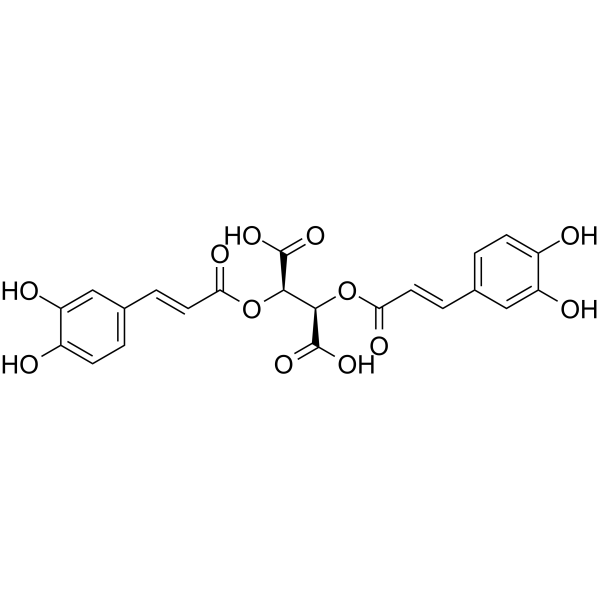Chicoric acid (Synonyms: L-Chicoric Acid, Dicaffeoyltartaric Acid, NSC 99173) |
| Catalog No.GC64993 |
Chicoric acid (Cichoric acid), an orally active dicaffeyltartaric acid, induces reactive oxygen species (ROS) generation.
Products are for research use only. Not for human use. We do not sell to patients.

Cas No.: 6537-80-0
Sample solution is provided at 25 µL, 10mM.
Chicoric acid (Cichoric acid), an orally active dicaffeyltartaric acid, induces reactive oxygen species (ROS) generation. Chicoric acid inhibits cell viability and induces mitochondria-dependent apoptosis in 3T3-L1 preadipocytes through ROS-mediated PI3K/Akt and MAPK signaling pathways. Chicoric acid increases glucose uptake, improves insulin resistance, and attenuates glucosamine-induced inflammation. Chicoric acid has antidiabetic properties and antioxidant, anti-inflammatory effects[1][2][3].
Chicoric acid (Cichoric acid; 10-200 μM; for 24, 48, and 72 h) causes a dose- and time-dependent decrease in cell viability[1]. Chicoric acid (100 μM; 48 h) induces apoptosis through caspase-3-dependent pathway[1]. Chicoric acid (100 μM; 48 h) decreases the protein level of p-Akt[1]. Chicoric acid (25, 50, 100 µM; for 24 hours) dramatically improves glucose uptake in a dose-dependent manner, and Chicoric acid further enhances insulin-induced (100 nM; 30 min) glucose uptake by 57.7% in HepG2 cells[2]. Chicoric acid (100 µM; for 24 hours) restores glucosamine-induced impairment of GLUT2 translocation through activating PI3K/Akt pathway in HepG2 cells[2]. Chicoric acid (100 µM) has no effects on HepG2 cell viability[2].
Chicoric acid (Cichoric acid; 60 mg/kg/day; drinking water for 4 weeks) inhibits pancreas apoptosis and adjusts islet function in diabetic mice, leading to an increase in insulin generation and secretion in C57BL/6J mice with Streptozotocin (STZ; 50 mg/kg; ip; for consecutive 5 days)[3].
[1]. Haifang Xiao, et al. Chicoric acid induces apoptosis in 3T3-L1 preadipocytes through ROS-mediated PI3K/Akt and MAPK signaling pathways. J Agric Food Chem. 2013 Feb 20;61(7):1509-20.
[2]. Di Zhu, et al. Cichoric Acid Reverses Insulin Resistance and Suppresses Inflammatory Responses in the Glucosamine-Induced HepG2 Cells. J Agric Food Chem. 2015 Dec 30;63(51):10903-13.
[3]. Di Zhu, et al. Cichoric acid improved hyperglycaemia and restored muscle injury via activating antioxidant response in MLD-STZ-induced diabetic mice. Food Chem Toxicol. 2017 Sep;107(Pt A):138-149.
Average Rating: 5 (Based on Reviews and 30 reference(s) in Google Scholar.)
GLPBIO products are for RESEARCH USE ONLY. Please make sure your review or question is research based.
Required fields are marked with *




















